复合句讲解
并列句复合句讲解

·
·
权
二、宾语从句的四个考点:
感
威
悟
解
中
读
考
考
语
点
法
·
强
名 师
化
精
训
讲
练
课
真
标
题
·
·
权
感
威
悟
解
中
读
考
考
语
点
法
·
强
名 师
化
精
训
讲
练
课
真
标
题
·
·
权
感
威 【提醒】当主句谓语动词为think, suppose, guess, believe等 悟
解
中
读 词,主语为第一人称时,从句表达否定意义时,形式上应否 考
· 感
威 解
叫作并列句。常见分类:
悟 中
读
考
1. 表示同等、平行或承接关系,常用连词and, both. . .
考 点
and, not only. . . but also. . . , neither. . . nor. . . , as well as等。 语
法
· 名 师
2. 表示转折关系,常用连词but, yet(然而), however(然
点击进入相应模块
课
真
标
题
·
·
权
感
威
悟
解
中
读
考
考
语
点
法
·
强
名 师
化
精
训
讲
练
课
真
标
题
外研版八年级下册并列复合句讲解及练习(含答案)
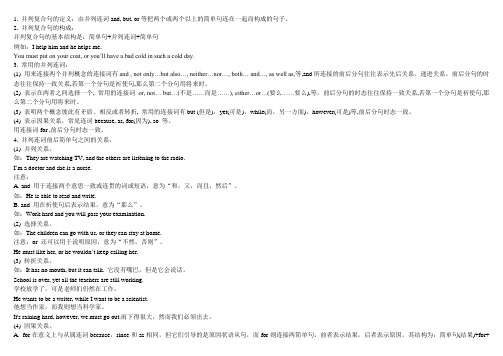
1. 并列复合句的定义:由并列连词and, but, or等把两个或两个以上的简单句连在一起而构成的句子。
2. 并列复合句的构成:并列复合句的基本结构是:简单句+并列连词+简单句例如:I help him and he helps me.You must put on your coat, or you’ll have a bad cold in such a cold day.3. 常用的并列连词:(1) 用来连接两个并列概念的连接词有and , not only…but also…, neither…nor…, both… and…, as well as,等,and所连接的前后分句往往表示先后关系、递进关系。
前后分句的时态往往保持一致关系,若第一个分句是祈使句,那么第二个分句用将来时。
(2) 表示在两者之间选择一个, 常用的连接词or, not… but…(不是……而是……), either…or…(要么……要么),等,前后分句的时态往往保持一致关系,若第一个分句是祈使句,那么第二个分句用将来时。
(3) 表明两个概念彼此有矛盾、相反或者转折, 常用的连接词有but (但是),yet(可是),while(而,另一方面),however(可是)等,前后分句时态一致。
(4) 表示因果关系,常见连词because, as, for(因为), so 等。
用连接词for ,前后分句时态一致。
4. 并列连词前后简单句之间的关系:(1) 并列关系。
如:They are watching TV, and the others are listening to the radio.I’m a doctor and she is a nurse.注意:A. and 用于连接两个意思一致或连贯的词或短语,意为“和,又,而且,然后”。
如:He is able to read and write.B. and 用在祈使句后表示结果,意为“那么”。
复合句讲解和练习

复合句(complex sentence)定义:用一个句子来充当某个句子成分(主、宾、表、定、状、同位),从而构成一个从句,该从句(subordinate clause)前需要使用“关系词(relative words)”来与主句(main clause)连接在一起,形成一个完整的句子。
从句类型:1)从句在主句的主语位置,称之为主语从句(subject clause),由于主语在句首,所以主语从句的位置通常为句首。
2)从句在主句的宾语位置,称之为宾语从句(object clause),由于宾语在谓语后面,所以谓语动词后面的句子通常是宾语从句。
3)从句在主句的表语位置,称之为表语从句(predicative clause),如果一个句子出现在系动词后面,通常是表语从句。
4)从句在主句的定语位置,称之为定语从句(attributive clause),由于超过一个单词的定语通常放在名词后面,修饰限定前面的面请,所以名词后面出现句子,通常是定语从句(当然同位语从句除外)。
5)从句在主句的状语位置,称之为状语从句(adverbial clause),由于状语通常出现在一个句子的句首或者句末,而且常有逗号隔开,所以如果一个带有关系词的句子出现在另一个句子的句首或者句末并用逗号隔开了,通常就是状语从句。
6)句子本身已有主语,如果主语后面再增加一个句子来对主语的性质和身份做具体的说明,则称之为主语同位语(appositive clause)。
而句子本身已有宾语,如果宾语后面再增加一个句子来对宾语的性质和身份做具体的说明,则称之为宾语同位语。
判断主从句:1)复合句中,句首不带关系词的句子为主句,带关系词的句子为从句(但是要注意关系词省略的情况:宾语从句的关系词通常可省略,定语从句所修饰的名词在定语从句充当宾语的话关系词可以省略),判断出主从句以后,就可以根据从句的位置判断属于哪类从句。
练习判断一下哪些句子是复合句,并标出从句部分,说明属于哪类从句。
初中英语复合句中考专项讲解与练习
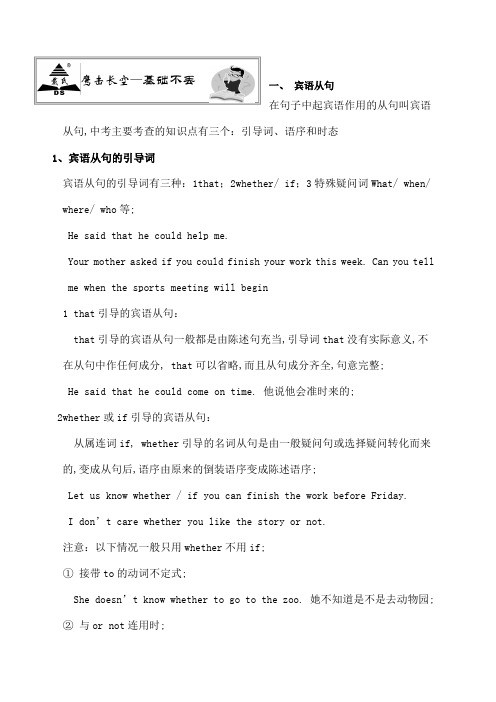
鹰击长空—基础不丢一、宾语从句在句子中起宾语作用的从句叫宾语从句,中考主要考查的知识点有三个:引导词、语序和时态1、宾语从句的引导词宾语从句的引导词有三种:1that;2whether/ if;3特殊疑问词What/ when/ where/ who等;He said that he could help me.Your mother asked if you could finish your work this week. Can you tell me when the sports meeting will begin1 that引导的宾语从句:that引导的宾语从句一般都是由陈述句充当,引导词that没有实际意义,不在从句中作任何成分, that可以省略,而且从句成分齐全,句意完整;He said that he could come on time. 他说他会准时来的;2whether或if引导的宾语从句:从属连词if, whether引导的名词从句是由一般疑问句或选择疑问转化而来的,变成从句后,语序由原来的倒装语序变成陈述语序;Let us know whether / if you can finish the work before Friday.I don’t care whether you like the story or not.注意:以下情况一般只用whether不用if;①接带to的动词不定式;She doesn’t know whether to go to the zoo. 她不知道是不是去动物园;②与or not连用时;I’m not sure whether or not he will come on time. 他能否准时来,我说不准;3疑问词引导的宾语从句:此类宾语从句原来是特殊疑问句,变成宾语从句后要用陈述语序,由wh-开头的疑问词引导;wh-词包括who, whom, whose, what, which等连接代词和where, when, how, why等连接副词,这些引导词有各自的意思,在从句中要作相应的成分,不能省略;例如:Could you tell me which gate we have to go toHe didn’t tell me how long he would stay here.2、宾语从句的三个注意事项1语序:宾语从句要用陈述语序,原来的倒装语序改成陈述语序时注意相应的助动词和动词的变化等;把这两个简单句合成一个复合句:Where does your father work Can you tell us →____________________________________________________Did you get home very late He asked me.→__________________________________________________2时态:如果主句是一般现在时,宾语从句根据实际情况用各种时态;My teacher says he will be back in a week. My teacher says he has seen the movie. 如果主句是一般过去时,宾语从句用相应的过去时态;My father said he was watching TV at that time. My father said the he had already seen the movie.如果宾语从句是表示客观真理和规律的句子时,用一般现在时;Our teacher told us the sun is much bigger than the earth. 我们的老师告诉我们太阳比地球大多了;3 否定转移:主句的主语如果是第一人称,从句的否定要转移到主句中,其反意疑问句与从句一致;例如:I don’t think they’ll wait to the last minute.I don’t believe he did this, did he二、定语从句用作定语的从句叫定语从句;定语从句一般放在它所修饰名词或代词的后面,这个名词或代词叫先行词,引导定语从句的连接词称为关系代词或者关系副词;关系代词在从句中代表先行词可以作主语、宾语、定语等;关系副词代表先行词在从句中可以作状语;1. 选出正确的关系代词或关系副词的关键:①看所修饰的是人还是物;②看它所代表的先行词在定语从句中做什么成分;例如:Do you know the man who/that sells eggs to me先行词是“the man”,在从句中作主语,用who/ thatYour father was not on the train that/ which arrived just now.先行词是物,用which/that,在从句中作主语This is the book which / that you wanted.先行词是物,用which/that,在从句中作宾语,可省Do you know the boy whose father is a doctor先行词是人,whose代表“男孩的”,在从句中作定语You can go home where you can have a rest.先行词是地点,where相当于at home,在从句中作地点状语Do you remember the year when we were hungry every day先行词是时间,when相当于in the year,在从句中作时间状语Do you know the reason why she didn’t come to our party 先行词是原因,why相当于for the reason,在从句中作原因状语2. 引导词作宾语时可以省略;例如:Have you seen the book that I gave you yesterday3. 引导词在定语从句中作主语,不能省略;例如:Do you know the man who is speaking to your father三、状语从句用作状语的句子叫状语从句;引导状语从句的连接词是从属连词;状语从句可以在句首,也可以在句尾,根据其用途可分为:时间状语从句、地点状语从句、原因状语从句、结果状语从句、目的状语从句、条件状语从句,比较状语从句等; 1. 时间状语从句:时间状语从句表示时间,常用连接词有:when当……时,while 当……时,as当……时,before在……之前,after在……之后,since自从,until 直到, as soon as一……就,once一旦……就等;例如:I didn’t go to bed until I finished my homework.I can listen to the radio while I work.注意:①时间状语从句中,要用一般现在时代替一般将来时;I will telephone you when he comes.I’ll stay here until you come back.② when引导时间状语从句,表示主句的动作和从句的动作同时或先后发生,从句的谓语可以是延续性动词,也可以是瞬间动词;例如:He was working when I went in.When she heard the news, she began to cry. while引导的状语从句中常用延续性动词或表示状态的动词,意思是“在……期间”;They rushed in while we were singing. 我们唱歌时,他们冲进来;as引导状语从句,强调同时发生,不分先后;可以译成“随着”或“一边……一边”;John sings as he walks home.③ while还可以表示两者之间的对比关系;I like playing football, while Tom likes listening to music.④ since引导状语从句,主句常用现在完成时,从句常用一般过去时;We have been friends since we met in Beijing. It has been six years since she left school.2. 地点状语从句:地点状语从句表示地点;其连接词有where哪里,wherever无论哪里等;Put it where you find it. You can sit wherever you like.3. 原因状语从句:原因状语从句表示原因或者理由;其连接词有:because因为,as 因为,since既然等;I often eat carrots because they are good for my health.As I don’t know the way, I had to ask the policeman.注意:① because表示因果关系语气最强,常用来回答why提出的问题;I didn’t tell them because they were too young.② because和so不能同在一个句子里;Because the book was expensive, Idi dn’t buy it. I 前不用so4. 结果状语从句:表示结果;其连接词有:so…that…如此……以致……,so that 结果,such… that…如此……以致……等;It’s such a good chance that you can’t miss it.注意:so…that 和such …that 都可以引导结果状语从句,注意so和such后面所接的词不同;① such... thatHe was such an honest man that he was praised by the teacher.They are such interesting novels that I want to read them once again.②但是如果名词前由many、much、few、little少等词修饰,则用so;例如:He had so many falls that he was black and blue all over.③ so ... thatHe runs so fast that nobody can catch up with him.Dr. Wang is so good that everybody loves and respects him.=He is so good a doctor that everybody loves and respects him.=He is such a good doctor that everybody loves and respects him.5. 目的状语从句:表示目的;其连接词有:so以便,so that为了,in order that 为了等,从句中多用情态动词can, will, may, should 等;He got up very early so that he could catch the first train.6. 条件状语从句:条件状语从句表示条件;其连接词有:if如果,unless 如果不,除非,as long as只要等;If it is fine tomorrow, we will go swimming. 如果明天天气好的话我们去游泳;注意:①条件状语从句中,要用一般现在时代替一般将来时;Unless it rains, the game will be played. 如果不下雨,比赛就将进行;② unless意思相当于if…not…;7. 让步状语从句:常由though/although 虽然,even if/ though 即使等引导; Though it’s hard work, I enjoy it.1. I don’t know if you come tomy party tomorrow. 〔解析〕本题是考查宾语从句的时态用法,从句子的意思理解是if 引导的宾语从句,要用一般将来时,此题误用作状语从句了;所以应把come 改为will/ can come;2. Can you tell me where does he study English〔解析〕本题是考查宾语从句的语序的用法,特殊疑问词引导的宾语从句用陈述语序,所以把助动词does 去掉,而且因为从句主语是he,还要把study 变成studies;3. My teacher told me that light traveled faster than the sound.〔解析〕本题是考查宾语从句的时态用法;宾语从句是表示客观真理即光速比声速快,所以宾语从句用一般现在时,而不受主句时态的影响;所以要把traveled 改为travels;4. They are the people and books who you want to learn.〔解析〕本题是考查定语从句的引导词用法,定语从句的先行词既有人和也有物,所以引导词要用人和物共用的that,不能用who 或者which;所以要把who 改为that;5. He got to school early if he could clean the classroom.〔解析〕本题是考查表示目的的状语从句的连接词的用法;if 引导条件状语从句,而此句应该用连接词so that 引导目的状语从句;所以把if 改为so that;T-shirt is so cool. Could you 突飞猛进—过手训练 突飞猛进—过手训练tell me________A. where you buy itB. where do you buy itC. where you bought itD. where did you buy it2. I can't forget the time ________ the earthquake happened in Yushu.A. whenB. whichC. thatD. where3. If the child _______, please telephone the police.A. foundB. is foundC. was foundD. has found4. I hurried _______I wouldn't be late for class.A. soB. so thatC. ifD. un less5. This is my beautiful school ________ is near the famous library.A. whereB. whichC. whoD. when6. Friends are those ________ make you smile,always open their hearts to you and encourage you to succeed.A. whichB. whatC. whomD. who7. —Does anyone know ________—I hear that he was born in Sweden.A. what he isB. when he was bornC. where he comes fromD. which country is he from8. I don't know if Jack ________. If he ________, call me, please.A. will come; will comesB. comes; comeC. comes; will comeD. will come; comes9. The TV play is about a true story ________ happened in Mianyang in 1998.A. itB. whatC. thatD. whensaid that she ___ to Guangzhou.A. has never goneB. had never goneC. has never beenD. had never been11. We ______ TV when the telephone ________.A. watched, was ringingB. were watching, rangC. were watching, ringsD. are watching, rang12. Do you like music ______ makes you relaxedA. itB. whatC. whoD. that13. —Do you know ________ the MP4 yesterday—Sorry. I've no idea about it.A. how much did he pay forB. how much he paid forC. he paid for how muchD. he paid how much for14. Is that the man ________ helped us a lot after the earthquakeA. whereB. whichC. whenD. who15. He met many problems ________ he was going over his lessons.A. beforeB. as soon asC. since D .while16. I don't know _________ the day after tomorrow.A. when does he comeB. how will he comeC. if he comesD. whether he'll come17. ________ well you drive, you must drive carefully.A. No matter whereB. In order thatC. No matter howD.As soon as18. We have to get up at 7:15 tomorrow morning, ________ we will be late for the 7:40 train.A. beforeB. orC. ifD. so19. Do you know what time _________A. the train leaveB. does the train leaveC. will the train leaveD. the train leaves20. I don't know _________. Can you tell me, pleaseA. how the two players are oldB. how old are the two playersC. the two players are how oldD. how old the two players are 21.Sorry, we don't have the coat ________ you need.A. whatB. whoC. whomD. which22. It's a serious problem. We can't decide ________ comes back.A. whileB. since C .until D. so23. It's snowing outside Put on more clothes, ________ you may catch a cold.A. andB. butC. orD. though24. The policeman asked me ________ at this time yesterday.A. what was I doingB. what did I doC. what I was doingD. what I do25. ______China is growing stronger and stronger, Chinese is taught in more and more countries.A. IfB. UnlessC. AsD. Although26.—Tommy, do you know if Frank _______ to the theatre with us this Sunday if it ________—Sorry, I have no idea.A. will go; is fineB. goes; is fineC. will go; is going to be fineD. goes; will be fine27. Could you ring me up as soon as he ______A. arrivedB. would arriveC. arrivesD. will arrive28. She asked Linda if___ go and get some.A. could sheB. she couldC. she canD. she may29. Linda said the moon___ round the earth.A. travelledB. has travelledC. travelsD. had travelled30. ---Who is the man _______ was talking to our English teacher---Oh It’s Mr Baker, our maths teacher.A. heB. thatC. whomD. which31. I hate the people ________ don’t help others when they are in trouble.A. whoB. whichC. theyD. where32. The foreigner _________ visited our school is from Canada.A. whichB. whenC. whoD. whom33. George Mallory was an English school teacher _______ loved climbing.A. whoB. whomC. heD. which34. This is the place ____I have ever visited.A. thereB. whenC. whereD. which35. Nobody knows the reason ______ she didn’t come to the meeting.A. thatB. whichC. whyD. when36. The moon is a world ______ there is no life.A. thatB. whichC. whereD. why37. He has forgotten the day _______ he arrived.A. whenB. whereC. thatD. which38. He still remembers the days ______ he spent with your family.A. whenB. whereC. thatD. on which39. Mr. White, ______ car had been stolen, came to the policeman.A. whoB. thatC. whoseD. which40. He got to the village _______ his family once lived before liberation.A. thatB. whichC. whenD. where。
初中英语复合句讲解及例句
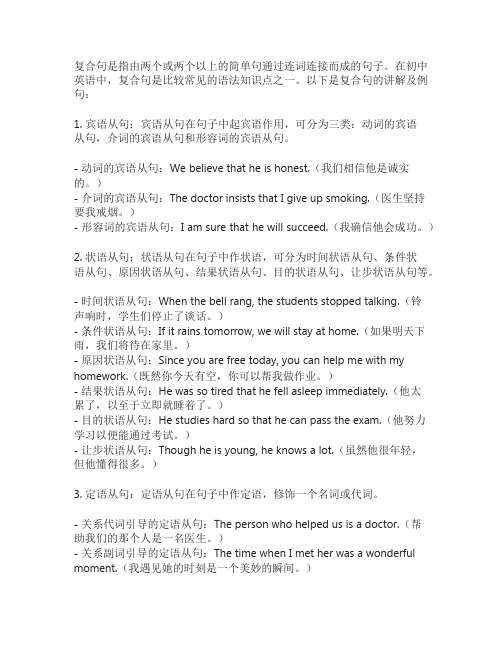
复合句是指由两个或两个以上的简单句通过连词连接而成的句子。
在初中英语中,复合句是比较常见的语法知识点之一。
以下是复合句的讲解及例句:1. 宾语从句:宾语从句在句子中起宾语作用,可分为三类:动词的宾语从句,介词的宾语从句和形容词的宾语从句。
- 动词的宾语从句:We believe that he is honest.(我们相信他是诚实的。
)- 介词的宾语从句:The doctor insists that I give up smoking.(医生坚持要我戒烟。
)- 形容词的宾语从句:I am sure that he will succeed.(我确信他会成功。
)2. 状语从句:状语从句在句子中作状语,可分为时间状语从句、条件状语从句、原因状语从句、结果状语从句、目的状语从句、让步状语从句等。
- 时间状语从句:When the bell rang, the students stopped talking.(铃声响时,学生们停止了谈话。
)- 条件状语从句:If it rains tomorrow, we will stay at home.(如果明天下雨,我们将待在家里。
)- 原因状语从句:Since you are free today, you can help me with my homework.(既然你今天有空,你可以帮我做作业。
)- 结果状语从句:He was so tired that he fell asleep immediately.(他太累了,以至于立即就睡着了。
)- 目的状语从句:He studies hard so that he can pass the exam.(他努力学习以便能通过考试。
)- 让步状语从句:Though he is young, he knows a lot.(虽然他很年轻,但他懂得很多。
)3. 定语从句:定语从句在句子中作定语,修饰一个名词或代词。
高中英语语法复合句讲解
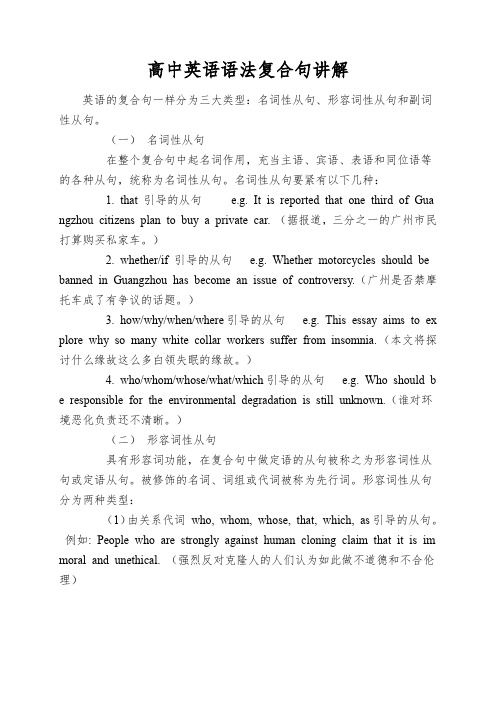
高中英语语法复合句讲解英语的复合句一样分为三大类型:名词性从句、形容词性从句和副词性从句。
(一)名词性从句在整个复合句中起名词作用,充当主语、宾语、表语和同位语等的各种从句,统称为名词性从句。
名词性从句要紧有以下几种:1. that 引导的从句 e.g. It is reported that one third of Gua ngzhou citizens plan to buy a private car. (据报道,三分之一的广州市民打算购买私家车。
)2. whether/if 引导的从句 e.g. Whether motorcycles should be banned in Guangzhou has become an issue of controversy.(广州是否禁摩托车成了有争议的话题。
)3. how/why/when/where引导的从句 e.g. This essay aims to ex plore why so many white collar workers suffer from insomnia. (本文将探讨什么缘故这么多白领失眠的缘故。
)4. who/whom/whose/what/which引导的从句 e.g. Who should be responsible for the environmental degradation is still unknown.(谁对环境恶化负责还不清晰。
)(二)形容词性从句具有形容词功能,在复合句中做定语的从句被称之为形容词性从句或定语从句。
被修饰的名词、词组或代词被称为先行词。
形容词性从句分为两种类型:(1)由关系代词who, whom, whose, that, which, as引导的从句。
例如: People who are strongly against human cloning claim that it is im moral and unethical. (强烈反对克隆人的人们认为如此做不道德和不合伦理)(2)由关系副词when, where, why引导的从句。
中考英语语法知识点归纳之复合句讲解
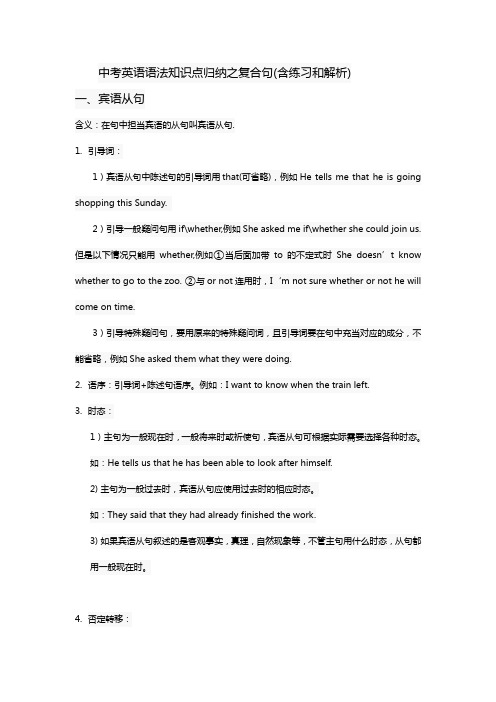
中考英语语法知识点归纳之复合句(含练习和解析)一、宾语从句含义:在句中担当宾语的从句叫宾语从句.1.引导词:1)宾语从句中陈述句的引导词用that(可省略),例如He tells me that he is going shopping this Sunday.2)引导一般疑问句用if\whether,例如She asked me if\whether she could join us. 但是以下情况只能用whether,例如①当后面加带to的不定式时She doesn’t know whether to go to the zoo. ②与or not连用时,I‘m not sure whether or not he will come on time.3)引导特殊疑问句,要用原来的特殊疑问词,且引导词要在句中充当对应的成分,不能省略,例如She asked them what they were doing.2.语序:引导词+陈述句语序。
例如:I want to know when the train left.3.时态:1)主句为一般现在时,一般将来时或祈使句,宾语从句可根据实际需要选择各种时态。
如:He tells us that he has been able to look after himself.2)主句为一般过去时,宾语从句应使用过去时的相应时态。
如:They said that they had already finished the work.3)如果宾语从句叙述的是客观事实,真理,自然现象等,不管主句用什么时态,从句都用一般现在时。
4.否定转移:当主句的主语为第一人称时,从句的否定要转移到主句中,其反义疑问句要与从句一致。
例如:I don’t think they will wait to the last minute.I don’t believe he did this, did he?宾语从句练习题1.-Hello, Jack. Haven't, seen you for long. I am calling to check _________ you are.- Very well. I'm glad you called.A. howB. what C .where D. who答案:选A,依句意是问候how are you2. - Can you guess _________the new Nike sports shoes?-Yes. Maybe he asked his grandpa to pay for them, I think.A. how he paid forB. where lie boughtC. when he paid forD. why he bought答案:选A,依句意是问新鞋子如何付款,所以用how pay3. - Can you tell me _______?- He is in the library.A, where was Jack B. where Jack wasC, where is Jack D. where Jack is答案:选D,时态与回答一致,一般现在时,且宾语从句语序为陈述语序4.-Can you tell me ________?- With Lucy's help.A. when you did it so wellB. when did you do it so wellC. how you did it so wellD. how did you do it so well答案:选C,,依句意是问方式,所以要用how, 且宾语从句语序为陈述语序5. - Could you tell me ________?- Of course.A. where's there a good place to eatB. where there's a good place to eatC. where is a good place to eatD. where a good place to eat答案:选B,宾语从句语序为陈述语序6. - Excuse me. could you tell me ______?-In the supermarket.A. where 1 can buy this kind of CD playerB. where can I buy this kind of CD playerC. if I can buy this kind of CD playerD. if can I buy this kind of CD player 答案:选A,句意为问在哪里买,要用where,且宾语从句语序为陈述语序7.The math problem is so hard. I really don't know_____.A. how to do itB. how to doC. what to do it答案:选A,句意为不知道如何做这道题,,用how。
复合句的讲解

复合句的讲解:一.概念:复合句(Complex Sentence)分为并列复合句和从属复合句,并列复合句是有并列连词:and、or、but 连接;从属复合句由一个主句(Principal Clause)和一个或一个以上的从句(Subordinate Clause)构成。
用疑问词作引导词,主句是全句的主体、通常可以独立存在;从句则是一个句子成分,不能独立存在。
从句不能单独成句,但它也有主语部分和谓语部分,就像一个句子一样。
所不同在于,从句须由一个关联词(connective) 引导。
分类:从属复合句可分为:1) .定语从句(The Attributive Clause);2) .状语从句(The Adverbial Clause);3) .名词性从句(The Noun Clause);2・定语从句的定义:定语从句在句中作定语,用来修饰一个名词、名词词组或者代词。
先行词和引导词被修饰的名词、名词词组或代词叫做先行词;在先行词和定语从句之间起连接作用的词叫做引导词。
引导词分为“关系代词”和“关系副词”。
2.:关系代词和关系副词关系代词有:who, whom, whose, that, which, as。
关系副词有:when, where, why o注意:关系副词里面没有how。
如果要修饰方式,用that或in which引导,或者不用引导词。
I don' t like the way (that, in which) he eyed me. 我不喜欢他看我的那个样子。
关系代词:who关系代词who在从句中主要作主语,在非正式语体里who还可以作从句中的宾语。
He is the man who wants to see you.关系代词:whomHe is the man (whom) I saw in the park yesterday. (whom 在从句中作宾语)关系代词:whosewhose用来指人或物,(只能用作定语,若指物,它还可以同of which互换)。
专题十七 主从复合句(讲解部分)-精品文档资料整理

that
人、物 主语、宾语 I know a foreigner that is from Japan.
我认识一个来自日本的外国人。
This is the pen Байду номын сангаасthat) I wrote the letter with. 这是我写信时用的那支钢笔。
栏目索引
关系代词 指代 作用
续表
例句
who
人 主语、宾语 She is the girl who lives next door.她就是住在隔壁的那个女孩。
逗号与主句隔开;不能用that引
家。
导,关系代词作宾语时也不能省
略
栏目索引
二、关系代词引导的定语从句 关系代词代替前面的先行词,在定语从句中作主语、宾语或定语等,其用法 具体如下:
关系代词 指代
作用
例句
which
物、句子 主语、宾语 The work which has just been finished is very important. 刚刚完成的那项工作很重要。 The book, which I bought yesterday, is very instructive. 我昨天买的那本书很有教育意义。
The people (who)we met in France have sent us a card. 我们在法
国结识的人给我们寄来了一张贺卡。
whom 人 宾语
whose
人、 定语 物
I happened to meet the professor(whom) I got to know at a party in the shopping center yesterday.昨天在购物中心,我碰巧遇见了那 位我在一次聚会上认识的教授。
复合句一-主语从句
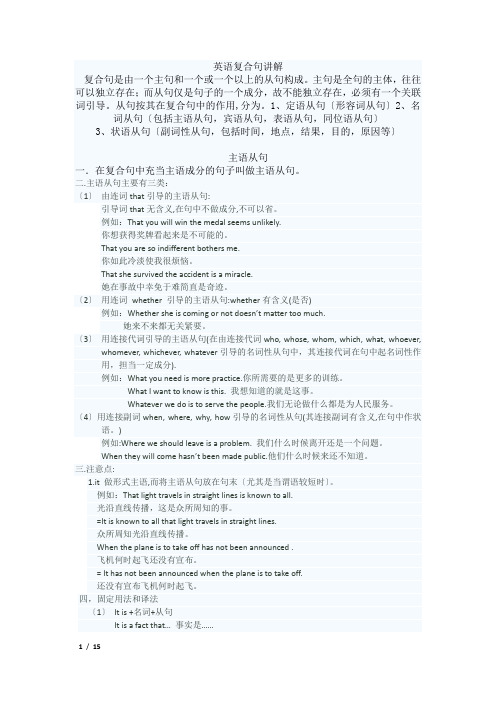
英语复合句讲解复合句是由一个主句和一个或一个以上的从句构成。
主句是全句的主体,往往可以独立存在;而从句仅是句子的一个成分,故不能独立存在,必须有一个关联词引导。
从句按其在复合句中的作用,分为。
1、定语从句〔形容词从句〕2、名词从句〔包括主语从句,宾语从句,表语从句,同位语从句〕3、状语从句〔副词性从句,包括时间,地点,结果,目的,原因等〕主语从句一.在复合句中充当主语成分的句子叫做主语从句。
二.主语从句主要有三类:〔1〕由连词that引导的主语从句:引导词that无含义,在句中不做成分,不可以省。
例如:That you will win the medal seems unlikely.你想获得奖牌看起来是不可能的。
That you are so indifferent bothers me.你如此冷淡使我很烦恼。
That she survived the accident is a miracle.她在事故中幸免于难简直是奇迹。
〔2〕用连词whether 引导的主语从句:whether有含义(是否)例如:Whether she is coming or not doesn’t matter too much.她来不来都无关紧要。
〔3〕用连接代词引导的主语从句(在由连接代词who, whose, whom, which, what, whoever, whomever, whichever, whatever引导的名词性从句中,其连接代词在句中起名词性作用,担当一定成分).例如:What you need is more practice.你所需要的是更多的训练。
What I want to know is this. 我想知道的就是这事。
Whatever we do is to serve the people.我们无论做什么都是为人民服务。
〔4〕用连接副词when, where, why, how引导的名词性从句(其连接副词有含义,在句中作状语。
复合句讲解英语课件

复合句讲解英语课件一、教学内容本节课我们将深入学习复合句的构成和用法。
教学内容基于《新概念英语》第三册第十一章“Compound Sentences”。
具体内容包括:1. 理解复合句的定义和特点;2. 掌握主从句之间的关系,如时间、条件、原因、结果等;3. 学会使用不同类型的连词构建复合句。
二、教学目标1. 学生能够理解并描述复合句的定义和特点;2. 学生能够正确构建主从句之间的逻辑关系,运用不同的连词;3. 学生能够在口语和书面表达中灵活运用复合句。
三、教学难点与重点1. 教学难点:主从句之间的逻辑关系和连词的正确使用;2. 教学重点:复合句的构建和运用。
四、教具与学具准备1. 教具:PPT、黑板、粉笔;2. 学具:笔记本、教材、练习册。
五、教学过程1. 导入:通过一个实践情景引入,让学生感受复合句在日常生活交流中的应用;2. 理论讲解:详细讲解复合句的定义、特点以及主从句之间的关系;3. 例题讲解:展示不同类型的复合句,分析其结构和用法;4. 随堂练习:让学生根据所学的理论知识,完成相应的练习题;5. 小组讨论:分组讨论,互相纠正,提高构建复合句的能力;六、板书设计1. 复合句的定义和特点;2. 主从句之间的逻辑关系;3. 常见连词及其用法;4. 例句展示。
七、作业设计1. 作业题目:(1)用给出的连词构建复合句;(2)将下列句子改写为复合句;(3)结合生活实际,编写一段含有复合句的对话。
2. 答案:(1)连词:because, although, if, when, so that例句:Because he was ill, he didn't go to school.(2)原句:He is tired. He will go to bed early.改写:Because he is tired, he will go to bed early.(3)答案略。
八、课后反思及拓展延伸2. 拓展延伸:鼓励学生在课后阅读英文文章,找出其中的复合句,并进行分析。
高中语法复合句用法讲解课件 (共15张PPT)

疑问句中应该用 形式主语It 句型
2 Whatever we do must be in the interest of the people. ( √ ) It must be in the interest of the people whatever we do ( × )
名词性关系代词whatever/whoever/whichever /wherever/what引导的主语从句一般放在句首
宾语从句并列时,只省略 第一个 that
4. Everything depends on whether we have enough time. ( if )
5. I don’t know whether he will come or not. ( if )
6. The question is whether he will agree . ( if )
4. 据说他已告诉了她一切.
It is said that he told her everything.
It is said只有 it 句型
More
注意: It looked that he was right. ( × ) 可以说: It looks as if….
7
2018-9-29
1 Is it true that the scientist will give us a lecture? ( √ ) Is that the scientist will give us a lecture true? ( )
比较: The man looked around. 那人看了看四周. (名词作主语)
That the boy failed again in the exam disappointed his mother.
(完整)复合句讲解
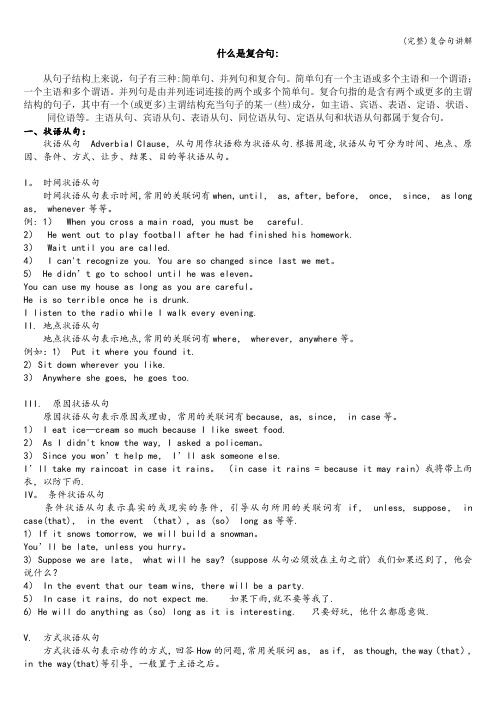
什么是复合句:从句子结构上来说,句子有三种:简单句、并列句和复合句。
简单句有一个主语或多个主语和一个谓语;一个主语和多个谓语。
并列句是由并列连词连接的两个或多个简单句。
复合句指的是含有两个或更多的主谓结构的句子,其中有一个(或更多)主谓结构充当句子的某一(些)成分,如主语、宾语、表语、定语、状语、同位语等。
主语从句、宾语从句、表语从句、同位语从句、定语从句和状语从句都属于复合句。
一、状语从句:状语从句 Adverbial Clause,从句用作状语称为状语从句.根据用途,状语从句可分为时间、地点、原因、条件、方式、让步、结果、目的等状语从句。
I。
时间状语从句时间状语从句表示时间,常用的关联词有when, until, as, after, before, once, since, as long as, whenever等等。
例: 1) When you cross a main road, you must be careful.2) He went out to play football after he had finished his homework.3) Wait until you are called.4) I can't recognize you. You are so changed since last we met。
5) He didn’t go to school until he was eleven。
You can use my house as long as you are careful。
He is so terrible once he is drunk.I listen to the radio while I walk every evening.II. 地点状语从句地点状语从句表示地点,常用的关联词有where, wherever, anywhere等。
复合句 讲解

复合句—名词性从句在句子中起名词作用的句子叫名词性从句(Noun Clauses)。
名词性从句的功能相当于名词词组, 它在复合句中能担任主语、宾语、表语、同位语、介词宾语等,因此根据它在句中不同的语法功能,名词从句又可分别称为主语从句、宾语从句、表语从句和同位语从句。
一.主语从句主语从句是在复合句中充当主语的从句,通常放在主句谓语动词之前或由形式主语it 代替,而本身放在句子末尾。
可以引导主语从句的关联词:that, whether,what,which,who,whom,whose,when,where,why.how.whatever,whoever等。
That he will succeed is certain 他会成功是肯定的Whether she will go there is not known 还不知道他是否去哪里What she said is not ture 她说的话不是真的who broke the window has not been found out. 谁打破了窗子还没有查出来1. It 作形式主语(1)It 作形式主语代替主语从句,把真正的主语从句移到句末。
It is not know who he isIt is a pity that you didn’t go to see the film. 你不去看那场电影真可惜。
It doesn’t interest me whether you succeed or not.我对你成功与否不感兴趣。
(2)用it 作形式主语的结构1) It is +名词+从句It is a fact that …事实是…It is an honor that …非常荣幸It is common knowledge that …是常识2) It is +形容词+从句It is natural that…很自然…It is strange that…奇怪的是…3) It is +不及物动词+从句It seems that…似乎…It happened that…碰巧…It appears that…似乎…4) It +过去分词+从句It is reported that…据报道…It has been proved that…已证实…It is said that…据说…2. 主语从句不可位于句首的情况:(1)if 引导的主语从句不可居于复合句句首,但whether可以。
2023年中考英语复习名词性从句讲解
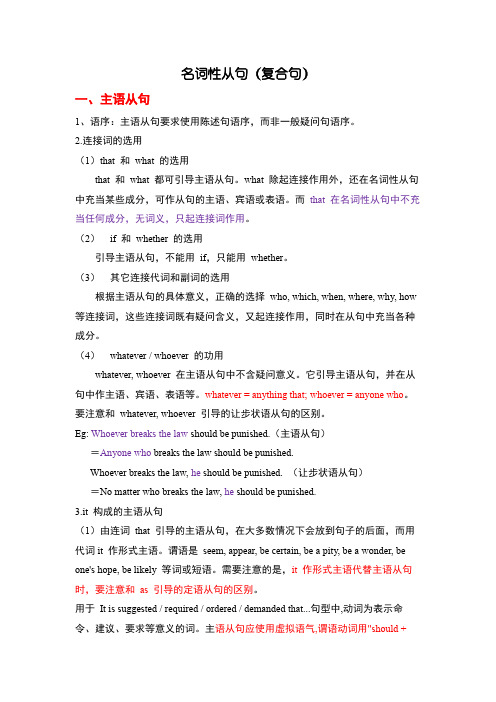
名词性从句(复合句)一、主语从句1、语序:主语从句要求使用陈述句语序,而非一般疑问句语序。
2.连接词的选用(1)that 和what 的选用that 和what 都可引导主语从句。
what 除起连接作用外,还在名词性从句中充当某些成分,可作从句的主语、宾语或表语。
而that 在名词性从句中不充当任何成分,无词义,只起连接词作用。
(2)if 和whether 的选用引导主语从句,不能用if,只能用whether。
(3)其它连接代词和副词的选用根据主语从句的具体意义,正确的选择who, which, when, where, why, how 等连接词,这些连接词既有疑问含义,又起连接作用,同时在从句中充当各种成分。
(4)whatever / whoever 的功用whatever, whoever 在主语从句中不含疑问意义。
它引导主语从句,并在从句中作主语、宾语、表语等。
whatever = anything that; whoever = anyone who。
要注意和whatever, whoever 引导的让步状语从句的区别。
Eg: Whoever breaks the law should be punished.(主语从句)=Anyone who breaks the law should be punished.Whoever breaks the law, he should be punished. (让步状语从句)=No matter who breaks the law, he should be punished.3.it 构成的主语从句(1)由连词that 引导的主语从句,在大多数情况下会放到句子的后面,而用代词it 作形式主语。
谓语是seem, appear, be certain, be a pity, be a wonder, be one's hope, be likely 等词或短语。
主从复合句 超实用讲解

2.原因状语从句 由 because,as,since 或复合连接词 now that,in that 等
引导。(注意:for 是连词,虽然也可以表示“因为”,但 其后所接的是并列句中的一个独立句,而非从句。) 3.地点状语从句 由 where,wherever引导。
(7)否定的转移 若主句谓语动词为 think,consider,suppose,believe,
expect,guess,imagine 等,且主语为第一人称,其后 的宾语从句若含有否定意义,一般要把否定词转移到主句 谓语上,从句谓语用肯定式。例如: I don't think this dress fits you well.我认为这件衣服不适合你 穿。
(2)做介词的宾语,例如: Our success depends upon how well we can cooperate
with one another. (3)做形容词的宾语,例如: I am afraid(that) I've made a mistake. (4)it 可以做形式宾语 it 不仅可以做形式主语,还可以做形式宾语,而真正的宾语
7.让步状语从句 由 though,although,even if,even though,however,
no matter how/what/who 等引导。注意对让步状语从句的 掌握要注意以下几点内容: (1)使用 though,although 时,务必避免与 but 连用,但可 以与 yet 连用。 (2)even if,even though 和 as if,as though 不同。后者常 常要求使用虚拟语气。
- 1、下载文档前请自行甄别文档内容的完整性,平台不提供额外的编辑、内容补充、找答案等附加服务。
- 2、"仅部分预览"的文档,不可在线预览部分如存在完整性等问题,可反馈申请退款(可完整预览的文档不适用该条件!)。
- 3、如文档侵犯您的权益,请联系客服反馈,我们会尽快为您处理(人工客服工作时间:9:00-18:30)。
什么是复合句:从句子结构上来说,句子有三种:简单句、并列句和复合句。
简单句有一个主语或多个主语和一个谓语;一个主语和多个谓语。
并列句是由并列连词连接的两个或多个简单句。
复合句指的是含有两个或更多的主谓结构的句子,其中有一个(或更多)主谓结构充当句子的某一(些)成分,如主语、宾语、表语、定语、状语、同位语等。
主语从句、宾语从句、表语从句、同位语从句、定语从句和状语从句都属于复合句。
一、状语从句:状语从句Adverbial Clause,从句用作状语称为状语从句。
根据用途,状语从句可分为时间、地点、原因、条件、方式、让步、结果、目的等状语从句。
I. 时间状语从句时间状语从句表示时间,常用的关联词有when, until, as, after, before, once, since, as long as, whenever等等。
例: 1) When you cross a main road, you must be careful.2) He went out to play football after he had finished his homework.3) Wait until you are called.4) I can't recognize you. You are so changed since last we met.5) He didn't go to school until he was eleven.You can use my house as long as you are careful.He is so terrible once he is drunk.I listen to the radio while I walk every evening.II. 地点状语从句地点状语从句表示地点,常用的关联词有where, wherever, anywhere等。
例如:1) Put it where you found it.2) Sit down wherever you like.3) Anywhere she goes, he goes too.III. 原因状语从句原因状语从句表示原因或理由,常用的关联词有because, as, since, in case等。
1) I eat ice-cream so much because I like sweet food.2) As I didn't know the way, I asked a policeman.3) Since you won't help me, I'll ask someone else.I'll take my raincoat in case it rains. (in case it rains = because it may rain)我将带上雨衣,以防下雨。
IV. 条件状语从句条件状语从句表示真实的或现实的条件,引导从句所用的关联词有if, unless, suppose, in case(that), in the event (that), as (so) long as等等。
1) If it snows tomorrow, we will build a snowman.You'll be late, unless you hurry.3) Suppose we are late, what will he say? (suppose从句必须放在主句之前) 我们如果迟到了,他会说什么?4) In the event that our team wins, there will be a party.5) In case it rains, do not expect me. 如果下雨,就不要等我了。
6) He will do anything as(so) long as it is interesting. 只要好玩,他什么都愿意做。
V. 方式状语从句方式状语从句表示动作的方式,回答How的问题,常用关联词as, as if, as though, the way(that), in the way(that)等引导,一般置于主语之后。
Do as I say. I did just as you told me. 照我说的去做。
我就是照你说的去做的。
He acts as if/as though he is the owner. 他行为举止好象是这儿的主人似的。
They did it in a way that I had never seen before. 他们以我从没见过的方式行事。
I was never allowed to sing the way I wanted to. 我从未被允许用自己想用的方式唱歌。
VI. 让步状语从句让步状语从句表示“虽然、尽管、即使”等概念,使句子具有对比的因素。
常用的关联词有although, though, even if, even though, not that(=although…not)等,置于主语之前或后。
1) Although you feel very ill right now, this is still a common disease.2) Though he has lived for years in London, he writes in French.3) We intend to go U.S., even if air fares are expensive.4) Even though fruits are good, you can't live with fruits only.5) I'm OK now, not that I slept (although I did not sleep) very well last night.VII. 结果状语从句结果状语从句表示结果,常由连词so…that, such(a/an)…that, so that, such that等引导,置于主语之后。
She was so frightened about the dog that she cried.The news worried him so much that he didn't sleep at all for the whole night. He is such a wonderful joker that you can't help laughing.They are such wonderful players that no one can beat them.We arrived early, so that we got good seats.The weather was such that I couldn't go out.VIII. 目的状语从句目的状语从句表示目的,回答what for或for what purpose的问题,常用关联词so that, in order that等引导,一般置于主语之后。
目的状语从句中的谓语动词常由“情态动词+动词原形”构成。
Ships carry lifeboats so that people can escape if the ship sinks.They wrote the notice in several languages so that foreigners could understand it.We carved their names on the stone in order that people should always remember them.They risk their lives so that/in order that they may support their kids.了解了状语从句,我们来看看例题讲解1.I'll go with you as soon as I ____my work.A.will finishB.shall finishC.finishD.finished选C.在时间、条件状语从句中,主句可能是祈使句、一般将来时或带情态动词,从句用一般现在时。
如果主句是过去将来时,从句可以用一般过去时。
能够引导时间状语从句、条件状语从句的从属连接词,常见的有:when,until(directly,unless,as long as,suppose等。
如:(1)Unless he comes,we won't be able to go.(2)Suppose it goes on raining,what shall we do?(3)Lu Xun often said,"As long as I am alive,I shall go on studying." 2.No sooner_____the news than they rushed out into the street.A.they heardB.they had heardC.did they hearD.had they heard选D.no sooner…than,hardly… when,scarcely… before表示"—…就",主句一般用过去完成时(h ad+V-ed),从句用一般过去时,如果hardly,no sooner, scarcely 放句首,主谓倒装。
3.Although he is considered a great writer,____(MET'91)A.his works are not widely readB.but his works are not widelyreadC.however his works are not widely readD.still his works arenot widely read选A.这是一个让步状语从句,主句与从句之间有一个从属连词although(though),不能再加but,howeve r,still等,但可以和yet连用。
4.No matter how hard he worked,____(84年)A.he could not do any betterB.and he could not do any betterC.so he could do any bettesD.but he could not do any better选A.由no matter引导的让步状语从句,其主句也不能再用but,and,so等并列连接词。
